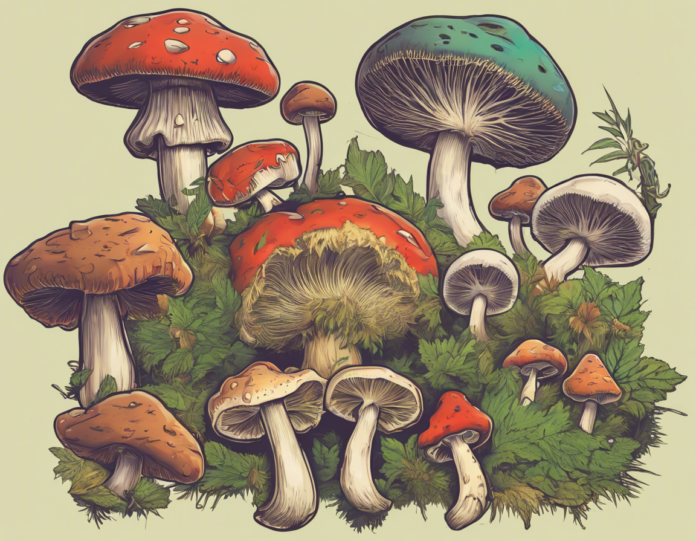Introduction
Mushrooms are a diverse group of organisms that belong to the fungi kingdom. While some are edible and nutritious, others can be toxic or even psychoactive. Over the years, cultivation of mushrooms has become increasingly popular due to their unique flavors, textures, and potential health benefits. In this guide, we will explore some of the best mushroom strains for cultivation, culinary purposes, and medicinal use.
Cultivation of Mushrooms
Before diving into specific mushroom strains, it is essential to understand the basic principles of cultivating mushrooms. Mushrooms are typically grown in a substrate made of materials such as sawdust, straw, or compost. The substrate acts as a nutrient source for the mushrooms to grow.
Key factors to consider for mushroom cultivation include:
- Hygiene: Maintaining a clean and sterile environment is crucial to prevent contamination by competing fungi or bacteria.
- Humidity: Mushrooms require a high level of humidity to grow successfully. This can be achieved through regular misting or by using a humidifier.
- Temperature: Each mushroom strain has its preferred temperature range for optimal growth. It is essential to research the specific requirements of the strain you are cultivating.
- Light: While some mushrooms require light to grow, others can thrive in complete darkness. Understanding the light needs of your chosen strain is essential.
Best Mushroom Strains
1. Shiitake (Lentinula edodes)
Shiitake mushrooms are one of the most popular and widely cultivated strains worldwide. Known for their rich, umami flavor, shiitake mushrooms are a staple in Asian cuisines. They are also prized for their potential health benefits, including immune-boosting properties and anti-inflammatory effects.
Key characteristics of Shiitake mushrooms:
- Flavor: Rich and savory, with a meaty texture
- Nutritional profile: High in protein, fiber, and vitamins
- Cultivation: Requires a substrate of hardwood sawdust or logs
- Growth conditions: Thrives in temperatures between 55-75°F (13-24°C)
2. Oyster mushrooms (Pleurotus spp.)
Oyster mushrooms are another popular choice for home cultivation due to their fast growth rate and versatile culinary uses. They come in various colors, including white, grey, and pink, and have a mild, sweet flavor.
Key characteristics of Oyster mushrooms:
- Flavor: Mild and sweet, with a velvety texture
- Nutritional profile: Low in calories and fat, rich in protein and antioxidants
- Cultivation: Can be grown on a variety of substrates, including straw, coffee grounds, and cardboard
- Growth conditions: Thrives in temperatures between 65-75°F (18-24°C)
3. Lion’s mane (Hericium erinaceus)
Lion’s mane mushrooms are known for their unique appearance, resembling a cascade of white cascading icicles. They have a delicate flavor reminiscent of seafood, making them a popular choice for vegetarian and vegan dishes. In addition to their culinary uses, lion’s mane mushrooms are believed to have neuroprotective properties and may support brain health.
Key characteristics of Lion’s mane mushrooms:
- Flavor: Delicate, with a slight seafood-like taste
- Nutritional profile: Contains compounds that may promote nerve growth and cognitive function
- Cultivation: Thrives on hardwood sawdust or logs
- Growth conditions: Prefers temperatures between 60-75°F (15-24°C)
4. Reishi (Ganoderma lucidum)
Reishi mushrooms, also known as the “mushrooms of immortality,” have been used for centuries in traditional Chinese medicine for their purported health benefits. While their bitter flavor may not appeal to everyone, reishi mushrooms are highly valued for their potential immune-boosting, anti-inflammatory, and antioxidant properties.
Key characteristics of Reishi mushrooms:
- Flavor: Bitter and earthy, often consumed in teas or tinctures
- Nutritional profile: Rich in polysaccharides and triterpenes with potential health benefits
- Cultivation: Grows on hardwood logs or sawdust supplemented with rice bran
- Growth conditions: Prefers temperatures between 70-85°F (21-29°C)
5. Psilocybin mushrooms (Psilocybe spp.)
Psilocybin mushrooms, also known as magic mushrooms, contain the psychoactive compound psilocybin, which can induce hallucinations and altered states of consciousness. While their recreational use is illegal in many countries, ongoing research suggests that psilocybin mushrooms may have potential therapeutic applications for mental health conditions such as depression and anxiety.
Key characteristics of Psilocybin mushrooms:
- Psychoactive effects: Induces altered states of consciousness, hallucinations, and connections
- Legality: Illegal in many countries for recreational use
- Therapeutic potential: Being explored for mental health conditions in clinical research settings
- Cultivation: Requires specialized techniques and substrates
FAQs (Frequently Asked Questions)
1. How do I store fresh mushrooms to prolong their shelf life?
Answer: Fresh mushrooms should be stored in a paper bag in the refrigerator to allow for airflow and prevent moisture buildup. Avoid storing mushrooms in plastic bags, as they can become slimy.
2. Can I grow mushrooms at home without a dedicated growing setup?
Answer: Yes, mushrooms can be grown at home using simple techniques and materials like straw, coffee grounds, or even cardboard. There are plenty of resources and kits available for beginners.
3. Are all mushrooms edible?
Answer: No, not all mushrooms are edible. Some wild mushrooms can be toxic or even deadly if consumed. It is crucial to be absolutely certain of your identification before consuming wild mushrooms.
4. What are the health benefits of consuming mushrooms?
Answer: Mushrooms are low in calories and fat but rich in essential nutrients like vitamins, minerals, and antioxidants. They may help boost immune function, support heart health, and even have potential anti-cancer properties.
5. Can mushrooms be used as a meat substitute in vegetarian or vegan diets?
Answer: Yes, mushrooms are commonly used as meat substitutes in vegetarian and vegan dishes due to their meaty texture and umami flavor. They can be a nutritious and versatile addition to plant-based diets.
Conclusion
Mushrooms offer a myriad of flavors, textures, and potential health benefits, making them a versatile ingredient in culinary creations and traditional medicine. From savory shiitake mushrooms to neuroprotective lion’s mane mushrooms and psychoactive psilocybin mushrooms, there is a vast array of strains to explore for cultivation and consumption. Whether you are a culinary enthusiast, a health-conscious individual, or a curious explorer of altered states of consciousness, mushrooms have something to offer for everyone. So, why not embark on a mushroom-growing adventure and elevate your culinary experience with these fascinating fungi?






